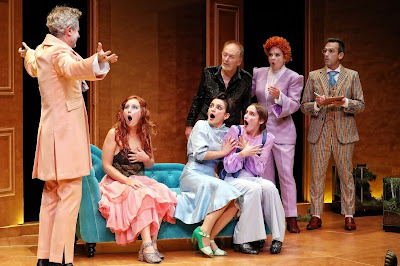 |
| Spooky Men's Chorale in rehearsal https://spookymen.com |
Reviewed by Frank McKone
Spooky Men’s workshop was a great example of classroom management, but raised questions in this one-time teacher’s consciousness about political bias in education and society.
The great thing about the National Folk Festival is that’s where you meet old friends on common grounds. Penny, a teaching colleague on occasions and a public servant retired from the federal Department of Education, is a person whose observations I know I can trust. Though it’s not possible to review the whole four-day NFF from the one day and five main performances I attended, she thought there was much less overt political material on show this year. Why would this be so with a May 18 election in the offing? Shouldn’t we expect more, not less?
Disturbing my self-indulgent equilibrium – just enjoying the wonder of singing, dancing and musicianship of my annual Easter escape into the world of folk – Penny’s thoughts struck home.
Of course, as you would expect, there were social issues behind the songs of Stu Tyrrell – but more of a personal nature than strictly political. His was literally a family show – his family – with his very young but wonderfully enthusiastic daughter up on stage with her favourite Dad. Ricardo Tesi & the Banditaliana were terrific performers, filling the Budawang with, for me, a new kind of concert Italian Folk. And just the fact that Yolngu man Gawurru Gaykamangu, from North East Arnhem Land, was performing his own work in language and had a crowd dancing along, was a political statement in itself.
Phil Bates, a quietly spoken and singing presenter of what I think of as traditional Australian folk songs, entirely un-commercial in origin, explicitly spoke and sang politically. His Andy’s Gone with Cattle Now by Henry Lawson made the life of the ever-waiting worker’s family a sad reflection on the demands required to earn a living. But only in his last item did he raise the politics of modern times. He said that in an interview, Arlo Guthrie had said we don’t need to write new songs about the dire straits of democracy, because we already have them from 1968.
So Bob Dylan’s The Times They Are A-Changin' made the point without need for further discussion. For me, though it was oddly ironic that Phil lost his words and couldn’t even get them again on a second try – for the very verse that I had to hear:
Come writers and critics
Who prophesize with your pen
And keep your eyes wide
The chance won't come again
And don't speak too soon
For the wheel's still in spin
And there's no tellin' who
That it's namin'.
For the loser now
Will be later to win
For the times they are a-changin'.
So the political guernsey falls on the shoulders of the Spooky Men’s Chorale, described (by them) – accurately – as a “vast, rumbling, steam powered and black clad behemoth, seemingly accidentally capable of rendering audiences moist eyed with mute appreciation or haplessly gurgling with merriment.” I know this is true because I saw them at a previous NFF, in between their overseas tours (they’re Blue Mountains men, from the fog-bound ranges west of Sydney).
But this was a workshop, and we were going to learn how to sing like them. So my praise begins with their musicianship – which certainly has my mute appreciation; and goes on to their leadership, teaching us a new song in four parts, rising in pitch and rhythmic complexity, our merriment gurgling all the way until a final point of chaotic haplessness.
Penny’s thoughts were stirred by the content of the song, which went basically like this (except for the bits I forgot while laughing):
Vote them; vote them; vote them; vote them out;
Vote them; vote them; vote the bastards out.
Then there was the maudling bit about wondering why some people vote them in, and wanting to leave the country.
Then a reprise of the original lines, designed to reach a crescendo of chaotic waving and yelling “out!”.
I thought GetUp! should take the Spooky Men to the electorate of Warringah to take over the campaign management, especially since our audience in The Majestic looked to me exactly like the middle class nice people who have set up Vote Tony Out at www.votetonyout.com .
But Penny pointed out the undercurrent of lack of enthusiasm for this election. She said what the corporates want is for people to not believe in anything to vote for. The ploy is to undermine representative democracy, to get government out of the way, not pay taxes, encourage individual libertarianism, and have people go along with “We’ll give a fair go to those who have a go”, and hard luck to the rest.
And suddenly (half a day after the Spooky workshop experience) I had the most horrifying thought.
The spooky part of their song it’s only against. Is the Spooky Men’s Chorale, by so cleverly getting us into a state of gurgling merriment over voting the bastards out, actually working as an arm of the corporates who want the ‘freedom’ from people being voted in because they are for something – like regulating the market.
Oh horror! Where goes the Folk Tradition now? Are The Times A-Changin’?
How Spooky is the Men’s Chorale!
© Frank McKone, Canberra

















